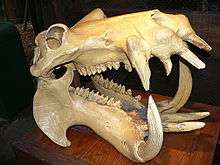Definify.com
Webster 1913 Edition
Skull
Skull
,Noun.
[See
School
a multitude.] A school, company, or shoal.
[Obs.]
A knavish
skull
of boys and girls did pelt at him. Warner.
These fishes enter in great flotes and skulls.
Holland.
Skull
,Noun.
[OE.
skulle
, sculle
, scolle
; akin to Scot. skull
, skoll
, a bowl, Sw. skalle
skull, skal
a shell, and E. scale
; cf. G. hirnschale
, Dan. hierneskal
. Cf. Scale
of a balance.] 1.
(Anat.)
The skeleton of the head of a vertebrate animal, including the brain case, or cranium, and the bones and cartilages of the face and mouth. See Illusts. of
Carnivora
, of Facial angles
under Facial
, and of Skeleton
, in Appendix. ☞ In many fishes the skull is almost wholly cartilaginous but in the higher vertebrates it is more or less completely ossified, several bones are developed in the face, and the cranium is made up, wholly or partially, of bony plates arranged in three segments, the frontal, parietal, and occipital, and usually closely united in the adult.
2.
The head or brain; the seat of intelligence; mind.
Skulls
that can not teach, and will not learn. Cowper.
3.
A covering for the head; a skullcap.
[Obs. & R.]
Let me put on my
skull
first. Beau. & Fl.
Webster 1828 Edition
Skull
SKULL
,Noun.
1.
The bone that forms the exterior of the head, and incloses the brain; the brain-pan. It is composed of several parts united at the sutures.2.
A person.Skulls that cannot teach and will not learn.
3.
Skull, for skeal or school, of fishDefinition 2026
skull
skull
English
Front view of a human (Homo sapiens's) skull

The skull of a hippopotamus
Alternative forms
- scull (obsolete)
Pronunciation
- enPR: skŭl, IPA(key): /skʌl/
- Homophone: scull
- Rhymes: -ʌl
Noun
skull (plural skulls)
- (anatomy) The main bones of the head considered as a unit; the cranium.
- 1922, Virginia Woolf, Jacob's Room Chapter 1
- He was about to roar when, lying among the black sticks and straw under the cliff, he saw a whole skull—perhaps a cow's skull, a skull, perhaps, with the teeth in it. Sobbing, but absent-mindedly, he ran farther and farther away until he held the skull in his arms.
- 1922, Virginia Woolf, Jacob's Room Chapter 1
- A symbol for death; death's-head
Derived terms
Synonyms
Meronyms
- Wikisaurus:skull
Translations
cranium
|
|
death's-head, skull
|
See also
Verb
skull (third-person singular simple present skulls, present participle skulling, simple past and past participle skulled)
- To hit in the head with a fist, a weapon, or a thrown object.
References
Etymology 2
See school (“a multitude”).
Noun
skull (plural skulls)
- Obsolete form of school (“a multitude”).
- 1586, William Warner, Albion’s England:
- A knavish skull of boys and girls did pelt at him.
- 1601, Philemon Holland (translator), Pliny the Elder (author), The Historie of the World. Commonly called, The Natvrall Historie of C. Plinivs Secvndvs., book IX, chapter xv: “Of the names and natures of many fishes.”:
- These fishs, togither with the old Tunies and the young, called Pelamides, enter in great flotes and skulls, into the sea Pontus, for the sweet food that they there find: and every companie of them hath their fever all leaders and captaines; and before them all, the Maquerels lead the way; which, while they be in the water, have a colour of brimstone; but without, like they be to the rest.
- 1586, William Warner, Albion’s England:
Swedish
Pronunciation
- IPA(key): /skɵlː/
Noun
skull c
- (on someone's) behalf; an archaic form of skuld (debt), used to indicate for whom or why something is done
- för min skull
- for me, because of me, on my behalf
- För edra hjärtans hårdhets skull tillstadde Moses eder att skiljas från edra hustrur
- Moses because of the hardness of your hearts suffered you to put away your wives (Matthew 19:8)
- för min skull